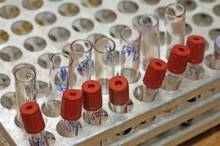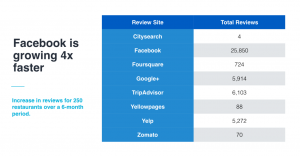
In an annual spring ritual at the University of North Carolina at Chapel Hill, startup companies associated with the university get the opportunity for five minutes of stage time to present their technologies or products to a live audience. The UNC Innovation Showcase is a popular draw for the Research Triangle’s broader entrepreneurial community. Startups selected for the event get to pitch in front of potential partners, advisors, and even a handful of investors.
The companies that presented Thursday night were started by students, faculty, or alumni, or are based on technologies licensed from UNC. In previous years, the showcase featured enough companies to offer life sciences and healthcare presentations in a separate room from presentations in other fields. But this year, 16 UNC companies presented in succession from the same stage, grouped by company maturity.
The “Emerging Companies” group, consisting of the most mature of the UNC startups, featured three companies targeting the life sciences and healthcare:
—Bivarus. The standard way that hospitals and physician clinics gather patient feedback is from surveys given on paper, or taken by phone. But the response rates for such surveys are low because no patient wants to sit through a 100-question survey, Bivarus CEO David Levin said. Durham, NC-based Bivarus offers a digital platform that can survey patients from their smartphones. The company has developed algorithms that dynamically determine which questions are the most important to ask. As a result, a patient needs to answer no more than 10 questions. In the healthcare facilities that have implemented the Bivarus software so far, Levin said that patient response rates have improved dramatically.
Levin said the opportunity for Bivarus comes in part from mandates that healthcare providers collect and analyze more information, including patient feedback. In February, Bivarus raised $ 1.9 million in Series A funding, which the company is using to boost its sales and marketing efforts. Levin said that Bivarus finished 2014 with $ 200,000 in revenue. The company now projects $ 1 million in annual recurring revenue by the end of this year. Bivarus was co-founded in 2012 by Seth Glickman, director of the Office of Population Health and Value at UNC Health Care, and Kevin Schulman, professor of medicine at Duke University.
—Spyryx Biosciences. The thick, sticky, mucus produced by patients who have cystic fibrosis can be traced to their genes. A genetic mutation causes a structural change in a protein that regulates the absorption of fluid by cells in the lung, explained John Taylor, CEO of Spyryx. When this protein isn’t functioning properly, fluid moves away from the lung’s surface, resulting in the thick mucus that causes breathing problems and becomes a breeding ground for bacteria and foreign particles. Research Triangle Park, NC-based Spyryx is developing a therapy that would block the channel by which fluid moves from the lung surface. Spyryx’s technology comes from the research of Robert Tarran, a professor in UNC’s department of cell biology and physiology.
If it works, the Spyryx drug could offer an advantage over the Vertex (NASDAQ: VRTX) cystic fibrosis drug ivacaftor (Kalydeco), which only works on a small percentage of cystic fibrosis patients with a specific genetic mutation. Taylor said that the way the Spyryx drug works would apply to all cystic fibrosis patients, regardless of their genetic makeup. Spyryx also plans to target chronic obstructive pulmonary disease. But it’s still early days for the company. Spyryx is conducting studies that would lead up to an investigational new drug application filing, which Taylor aims to file with the FDA in 2016. Spyryx is supported by $ 2 million in grant funding secured by Tarran’s lab. Taylor said he has also spoken with venture capitalists in his search for additional funding.
—Symberix. Research is starting to reveal the ways that bacteria in the human body affect health. Symberix’s microbiome research is based on the understanding that the toxic effects of some drugs are caused by a drug’s interaction with gut bacteria. The Durham company is developing a compound that could eliminate the side effects of drugs without having an antibiotic effect on the microbiome. The two types of drugs that Symberix would like to make safer are non-steroidal anti-inflammatory drugs, and the cancer drug irinotecan. Ward Peterson, co-founder, president, and CEO of Symberix, said that the gastrointestinal side effects caused by these drugs comes from a bacterial enzyme that produces toxic drug byproducts in the lower gastrointestinal tract. Symberix’s technology can inhibit this bacterial enzyme without harming the microbiome. The technology is based on the research of Matthew Redbino, a UNC professor of chemistry, biochemistry, and microbiology.
The opportunity for Symberix extends beyond anti-inflammatories and cancer drugs. Peterson said that the technology could eliminate side effects of other drugs in other indications. Symberix is financed by $ 3.5 million that was raised prior to the 2013 formation of the company. Peterson said Symberix has also received $ 300,000 in non-dilutive funding from the National Cancer Institute. The company aims to enter Phase 1 clinical trials in 2017.
Two other life sciences companies presented in the “Emerging Startups” group:
—Ribometrix. The biosciences company has developed a technology that allows researchers to analyze RNA to understand the role that RNA structure plays in biological processes and disease. Kevin Weeks, Ribometrix’s founder, said that the company has developed the technology into research kits for academic and industry researchers. Ribometrix already has a handful of customers in both industry and academia. The technology has also drawn interest from Cambridge, MA-based messenger RNA drug developer Moderna, which Weeks said has pumped $ 100,000 into the startup.
—SIRSvision. The refraction part of an eye exam is a century-old procedure that is subjective, and relies on a patient’s ability to remember and compare images. SIRSvision has developed a system that allows eye doctors to present two images side by side. The Simultaneous Image Refraction System (SIRS) was designed to enhance eye refraction experience for patients by making the exam faster, more accurate, and less confusing. The system was developed to be retrofitted onto existing phoropters, the ophthalmic testing device used for refraction. SIRSvision has already filed for a patent on its system.
(239)






